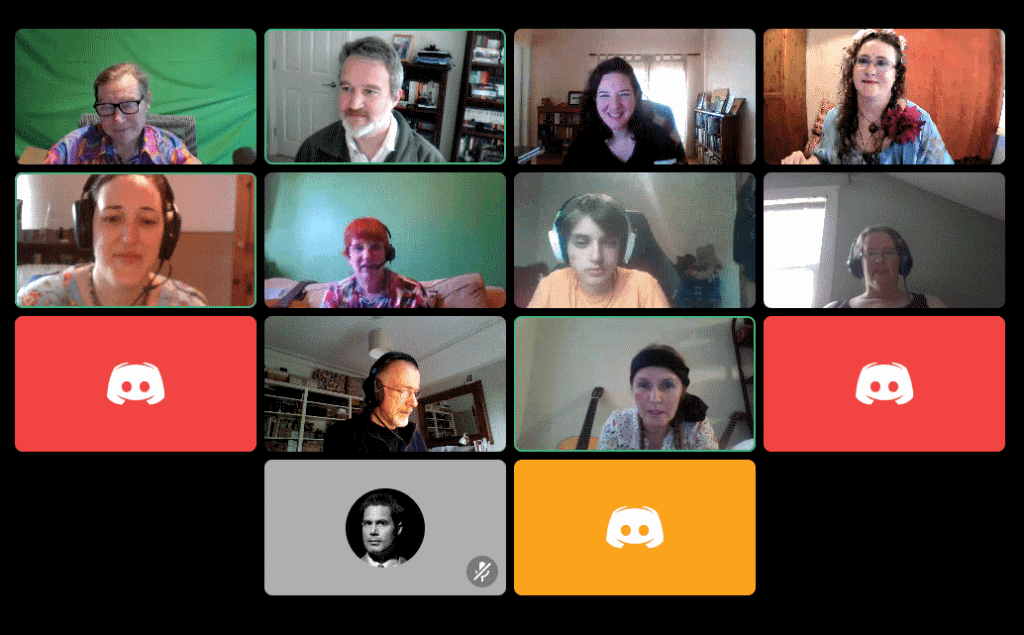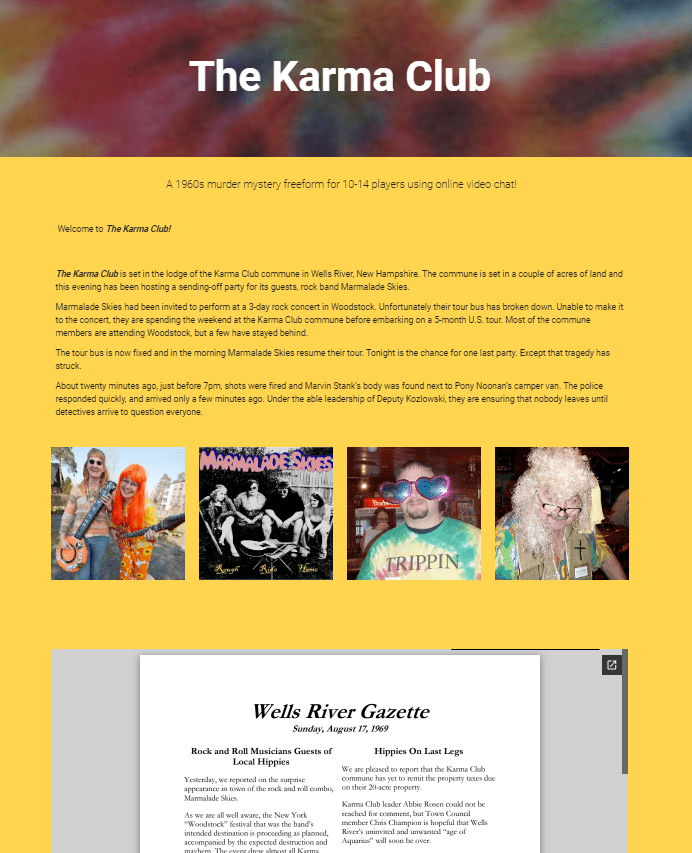Note: We now include a guide for online play with all of our murder mystery games. That guide was largely based on these tips, although there’s a little more detail here.
Last weekend we hosted The Karma Club for 14 players online, and combined with our experiences of Reunion With Death and Death in Venice, I thought I’d share a few tips for hosting our games online.

Four key aspects
The four key aspects of an online game:
- Setting it up – making sure everything works before you start hosting
- Video chat – which video chat system you use
- Announcements – you will need to make announcements
- Game mechanics – how you will deal with items, abilities, combat, locations and so on.
I’ll discuss each in turn below.
Setting your party up
In many ways, preparing for an online party is much the same as for a regular party. You still need to send out invitations, check that everyone is attending, cast your game and so on. However there are also a few differences…
Most of the differences are around deciding on which video chat to use and how you are going to manage announcements or items, and I’ll cover those below.
For The Karma Club, I was inspired by one of our customers who ran Murder at Sea. They had set up a website for their online party, with links to the Zoom rooms, Google Hangouts and to their character folders. I did the same and built a Karma Club website using Google Sites (which is free and easy to use). I included the game details, links to the character folders, and details of how the game would work.

(I originally had links to the game rooms, which I set up using Jitsi. But that didn’t work – more on that below.)
There’s no reason you can’t set up a website for your regular parties of course. (If you’ve already done that and would be happy to share, we’d love to see your websites! Click here to tell us about them.)
Video Chat
There are lots of different video chat systems now available, but whichever you choose it needs three key features:
- It needs to be able to cope with the number of players and GMs in one room (mainly for the briefing and debriefing). Some systems (eg Google Hangouts) have a maximum size of 10.
- You need lots of smaller rooms (or channels) for people to talk in small groups.
- It needs to allow people to be present for about three hours. (Most do – but the free version of Zoom only allows group calls for 40 minutes max.)
I don’t have experience of many video chat systems, but I’m going to cover a few of the more well-known systems.
Zoom is one of the most popular video chat apps. The basic plan is free, and you can host up to 100 participants, which is more than enough. You can also create breakout rooms for everyone. The downsides of Zoom are that the meeting host has to move people in and out of the breakout rooms, and that the free plan only allows groups to chat for 40 minutes (but you can rejoin).
Google Hangouts is really easy to use and doesn’t require any special software. However, it only allows 10 people at most, and while you can create separate hangouts, you can’t easily see who is in them. (But that’s not that different from playing in real life…) Hangouts’ biggest flaw is not knowing how long Google will continue supporting it, particularly now that they are promoting Google Meet (which I’ve not used).
Jitsi is a free alternative to Google Hangouts, but will manage bigger groups. However, I have found it to be very unreliable – I had planned to use it for The Karma Club, but it was so unstable we moved to Discord instead.
Discord is the system I would recommend – providing you have access to someone who can set up an area for you to play in. Discord has been used by gamers for years for voice chat while they play online – it’s stable and doesn’t use much bandwidth. But it has a fairly steep learning curve if you are setting up a server (it’s a much simpler if you’re just using it to play a game). Discord allows for lots of sub-rooms, and players can move themselves from room to room. (Click here for our tips for setting up a Discord server.)
Video chat tips:
- If possible, arrange a test beforehand to make sure it works with everyone at the same time. Be prepared to change if things don’t go according to plan.
- Give your rooms/channels appropriate names. But don’t use in-game locations, if they are used as part of the game. For example, in The Karma Club I had set up a video chat space as “Bob’s Room.” My thinking was that Bob could use that for a private chat. But if players then wanted to hide something in Bob’s room then they’d instinctively go there to do that (and that was a problem if I wasn’t there to supervise). So next time I will use different names (or locations completely unrelated to key game locations) so that people can say “Let’s go to the Purple Room” and if someone needs to hide something in Bob’s room, they know to talk to me.
- If your video chat system allows it, get everyone to change their screen name to their character name as that will make it easier for everyone to find each other.
- Set up an “out of character” room for everyone to congregate in before the game and where you will deliver the briefing and debriefing.
- If you’re suffering from lag issues it may be due to your computer rather than the chat server or your broadband speed. Try closing other apps (that may be causing conflicts), update your drivers or even reinstall the software. I also know someone who when they checked their Task Manager found that they had 5 instances of Discord running – which won’t have helped!
Announcements
One of the downsides of online play is that it can be hard to make announcements during the game. For example, most of our games have announcements at various times such as clues to the murder and so on.
How do you make those if everyone is in their own video chat?
Some ideas:
- Some systems (such as Discord) allow you to send updates and messages to all the players. This is probably the simplest way.
- If you’ve got a small game and you’re using something like Google Hangouts, it’s quite easy to drop into each chat and paste the announcement into the chat window.
- For The Karma Club, I had set up a Facebook event page so that I could post updates as the game approached and for announcements during the game. There were two problems with this idea: First, not everyone was on Facebook. Second, not everyone saw their notifications – so if you’re going to do this make sure everyone has their notifications enabled for the event.
Rules briefing: Don’t forget to do a full rules briefing at the start, including how things like abilities and items and locations will work online. Even though you’ve probably explained in advance how these things will work, you can guarantee that someone hasn’t read that or has forgotten what you told them.
Ending the party: When I am running a live game I will often decide when to end the game based on the energy in the room. When the energy is high (lots of people whispering in corners) then I know the game is going well. As players start to achieve their goals and run out of plots the room will start to get quieter.
That’s obviously much harder to do online and for The Karma Club I just used our game timetable.
Game mechanics
Our games include special abilities, items that move from character to character and (occasionally) specific game locations. We’ve designed the games to be played face-to-face, and these aspects of our games need some thinking about when playing online.
You might want a second host to help run the abilities and items (Mo helped me with The Karma Club.)
(Our two online games, Death in Venice and Reunion with Death specifically don’t include items, money or locations so that they are easy to play online.)
Abilities
For The Karma Club, and our online games, we recommend that players print out their abilities, Secret and Clue. That way they can hold them up to their webcam when either they need to use an ability or reveal their Secret/Clue.
For those who don’t have a printer at home, then trust works equally well. (Or you could have the character booklet on your phone/tablet and hold that up.)
Items and money
For The Karma Club I used the Windows Snipping Tool to turn all the items and money into graphical png files. I named each file the item name, plus a unique number (“notepad-72.png” and “USD100-23.png”). The unique number was because some of the files had duplicated names (particularly the money).

I set up Google Drive folders for each character, and into those put their character sheet and their items and money. The players had access to their own folders, but no others. If they wanted to give an item or some money to another player, they sent me a message and I moved the files from one folder to another.
Tips
- Make sure you move the files, don’t just copy them!
- Keep a complete set of the files you’ve created in a spare folder that only you can see, just in case something goes wrong!
You can also do this with Dropbox or OneDrive or whichever cloud storage works best for you.
You could also do this with a spreadsheet to track items and money.
Locations
Very few of our games use specific locations, but for those that do then it’s generally best if players speak to the host when they want to access a specific location.
And as I mentioned above, be careful naming your video chat rooms. It’s very tempting to give them “realistic” names to give your players a sense of moving around the physical space, but that can create confusion if the players think that that’s also where they interact with the locations.
Another option for locations is to create a folder for each (using Google Drive/Dropbox/OneDrive/etc as above) and put a description of the location in each folder (in a Word file or similar). Then players can go into those folders to “visit” the locations. If there are items there they can be in the folder and they can then take those items themselves, without needing a host to manage. (I know of a group who did this, but I worry about players accidentally deleting or duplicating something, so I didn’t do that for The Karma Club.)
Online games in summary
I’m pleasantly surprised at how well our games work online. While they’ll never fully replace the experience of playing face-to-face, I expect that the advantages (no need to travel, you can play with people from different time zones) mean that even after this crisis has passed they will still be played now and again.
We’re always interested in hearing about your stories – so if you successfully run one of our games online or face-to-face, please let us know!

Pingback: Hosting and Playing Death in Venice | Freeform Games murder mystery blog
Pingback: Using Discord for online murder mystery games | Freeform Games murder mystery blog
Pingback: Krimidinner online spielen - Tipps zum Online-Hosting unserer Krimispiele
Pingback: Kumospace tips | Freeform Games murder mystery blog